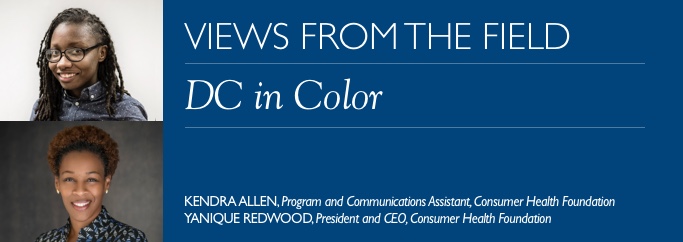
Washington, DC is often imagined as a city of monuments and government buildings. The truth is that 700,000 residents call the District of Columbia home. It is one of the most segregated cities in the United States, with many of its Black residents living east of the Anacostia River and its white and Hispanic residents living west of the river. Like the rest of the country, DC has had to contend with the policies of the past—such as redlining, restrictive housing covenants, and refusal to hire nonwhites—that prevented people of color from fully participating as citizens both socially and economically.
At Consumer Health Foundation (CHF), we believe that to achieve health equity, we must advocate for racial equity and economic justice. Our racial equity approach includes disaggregating data by race and place, grounding our work in history, relying on community leadership, using a racial equity impact assessment tool, and educating elected officials and agency leaders so that they can advance racially equitable policies and systems. In 2016, we embarked on a journey employing these strategies.
We commissioned data dis-aggregated by race and place.
We began assessing inequities in the District to help us understand actual numbers (not percentages) of people that would demonstrate that our city was on the path to achieving racial equity. Along with the Eugene and Agnes E. Meyer Foundation, we commissioned research from the Urban Institute on indicators of health, income, wealth, housing, and education by race and place in DC. We later did the same for parts of Virginia and Maryland.
For example, we found that DC has the highest infant mortality rate in the United States and that most of those deaths are to Black mothers. The data showed that 83 percent of births to white mothers were to mothers who had received adequate prenatal care and only 50 percent of births to Black mothers and 57 percent of births to Hispanic mothers had received adequate care. Hospital closings and health plan changes in the past year have created a maternal health care crisis for expecting women of color in DC. In a racially equitable DC, at least 970 more Black mothers and 190 more Hispanic mothers would receive adequate prenatal care. This should be achievable.
We grounded our work in history.
We believe every place needs a proper accounting of its racialized history in order to identify the solutions that will be most transformative. The fight for and the achievement of home rule made this city what it is today. The revolution following the 1968 riots on U street made this city what it is today. The 1991 Mount Pleasant uprising that sparked a review of the District’s immigration policies made this city what it is today. We identified events and policies like these that helped shape the realities of communities of color, and created equity timelines of DC, Maryland, and Virginia. This research helped to inform our work and the work of grantee partners and others.
We relied on community leadership.
Next, we engaged 85 participants from predominantly Black and Hispanic communities where racial inequities were the starkest—wards 1, 4, 5, 7, and 8. We had two simple objectives: to engage communities of color in a discussion on their experiences and the impact of structural racism in their lives and to develop policy solutions. We worked with community organizers to facilitate the conversations, and after completing the individual ward conversations, we cohosted a daylong convening for community members from different wards to build community and discuss common issues. Community members will have an opportunity to share their ideas with policymakers at an upcoming hearing on a racial equity resolution that was adopted by the council.
We now require racial equity impact assessment in our grant proposal process.
In recent years, many of our grantee partners asked us for more concrete guidance on applying a racial equity approach to their work. As we assessed the resources and skills that were needed, it made sense to introduce a racial equity impact assessment (REIA) tool into our grantmaking.
According to Race Forward, an REIA tool is “a systematic examination of how different racial and ethnic groups will likely be affected by a proposed action or decision. This tool is used during the decision-making process to prevent institutional racism and to discover ways to remedy inequities.”
CHF developed its own tool using Race Forward’s and the Western States Center’s tools as inspiration, and in 2017, we issued a new request for proposals that required applicants to use the tool. For many of our grantee partners, this was a difficult tool, requiring analysis of racialized histories and root causes, as well as translation of that analysis into new kinds of policy solutions. Prior to rolling out the tool, CHF hosted four trainings, a training-of-trainers and two request for proposal (RFP) information sessions that included a tutorial on how to use the tool.
We educated agency leaders and elected officials.
CHF is a member of the DC Initiative on Racial Equity and Local Governments, a group seeking to raise awareness about the role of local governments in advancing racial equity in partnership with community members, nonprofit organizations, foundations, and businesses.
In December 2017, the Initiative cosponsored a workshop with the Government Alliance on Race and Equity (GARE) entitled Advancing Racial Equity: The Role of Government to educate policymakers and to provide them with examples of national and local best practices. GARE emphasized both the government’s role in harming communities of color and community members’ historical activism to pressure government to pass fair policies. Facilitators also discussed the idea that there is an unspoken rule about not discussing race in government which has made it more difficult to achieve the change we would like to see.
Policymakers and their staff were given advice on how to apply a racial equity lens to their work, which included developing a shared language and analysis and organizing within government. Participants were also led through exercises that included communicating about race, using the racial equity assessment tool, and how to use their respective roles to advance racial equity. Since this meeting, we have also engaged city council members and their staff in additional training opportunities, which has resulted in the launch of a racial equity and social justice working group of cross-sector leaders.
Conclusion
As we review the partnerships built, tactics used, and insights gained over the last two years, we are inspired to see a racial equity field emerging in our region. Although nascent, we move forward compelled by our vision of a region and nation in which everyone lives a healthy and dignified life. We hope to find more allies, especially among our philanthropic colleagues, who possess the resources and leadership needed to support thriving healthy regions that center the realities of communities of color.

